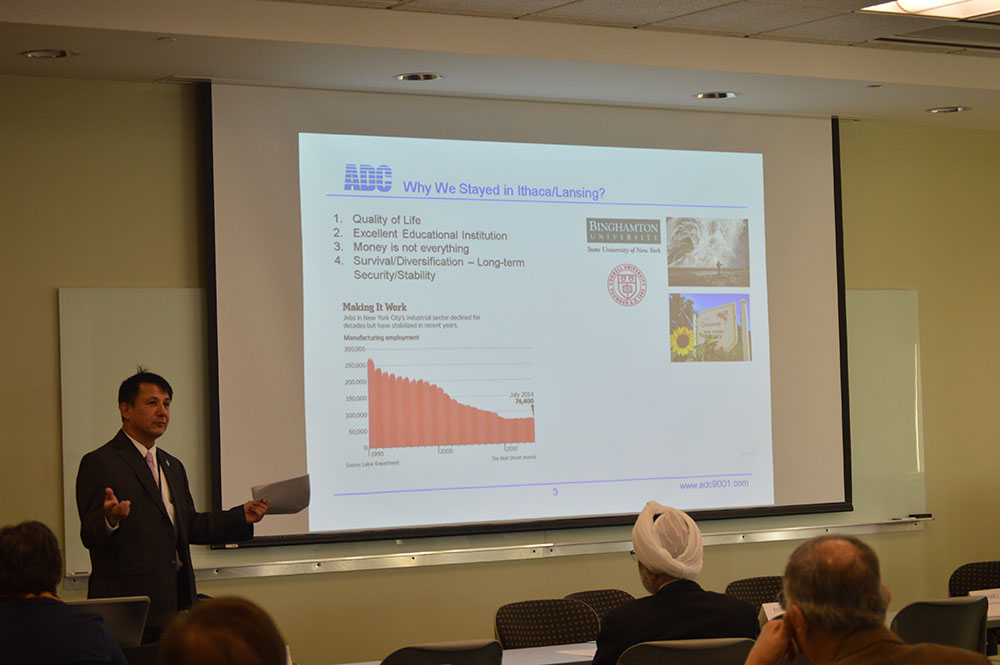Forum aimed to spark entrepreneurial ideas regionally
University community, public officials and business owners discuss how to encourage global entrepreneurship in the Southern Tier

Binghamton University hosted the second annual global trade and investment forum for the Southern Tier region on Nov. 14. The event’s theme was global entrepreneurship, in conjunction with Global Entrepreneurship Week, which aims to spark new ideas, inspire entrepreneurial activity and connect like-minded innovators, mentors and investors from across the globe.
The forum, hosted by Binghamton University Center for International Business Advancement (CIBA) and the Office of Entrepreneurship and Innovation Partnerships, featured a diverse array of speakers who highlighted ways to communicate, collaborate and advance entrepreneurial activity and support businesses of any size in pursuing global markets.
“In order for smaller businesses to succeed in the global market, it’s essential to link industry and academia to encourage best-practice sharing and to develop globally-oriented applied research,” said Elena Iankova, founding director of CIBA and adjunct professor in the School of Management.
Alex Deyhim, founding member and president of Advanced Design Consulting (ADC) spoke about the company’s success in “going global.” The company, based in Lansing, NY, has experienced a twenty-year tenure of continuous growth and profitability, and has more than 500 customers in over 26 countries.
ADC develops and supplies advanced scientific tools and instruments to corporations and government agencies. Deyhim said global expansion was a logical next step for the company to diversify its customer base and widen its markets. He also acknowledged that its business model is quite unique, as ADC conducts “99 percent” of its business in other parts of the country or overseas.
“As an entrepreneur, you can’t predict every outcome, and sometimes you just have to go for it. There’s often more risk in not taking any risk at all,” he said.
He believes that this go-getter approach and attitude has contributed to the company’s international success over the years: “You can’t just focus on strategy as an entrepreneur, that doesn’t pay the bills,” he said.
Deyhim said having the company’s home base in the United States has also yielded intangible benefits.
“There’s a certain advantage and air of respect that comes with being an American brand. Many other nations around the world look up to America,” he said.
Mitchell Ferguson — acting director in the Bureau of Economic and Business Affairs, Office of Bilateral Trade Affairs, U.S. Department of State — talked about the nation’s history of global trade. Ferguson, who has worked at the Department of State for more than two decades, has focused his career on bilateral trade, and has negotiated agreements with Colombia, Mexico and South Africa.
He said trade protest is not a new concept, but the topic becomes super-charged during national climates such as presidential elections.
Ferguson also said the country needs to improve its discussions on the effects of trade and policy changes to strengthen the global economy.
“Our government and its citizens need to have a national dialogue about the effects of trade,” Ferguson said. “Dislocation does occur because of trade. But trade has been around for a long time, and it’s very difficult to consider how limiting our trade with Asia would impact international policy and relations.”
Ferguson added, “the federal government has been working for a very long time on set of rules that will make international trade easier for businesses of all sizes.”
According to Ferguson, the ultimate vision for the U.S. Department of State is to create a worldwide trading platform to ensure organizations of all sizes are able to participate in international trade and business.
“This country has gone through its peaks and valleys in terms of our international trade agreements, but we are working on new plans and policies to improve trading conditions for all businesses” Ferguson said.
More than 40 people attended throughout the event, including representatives of the U.S. Commercial Service of the Department of Commerce, the Small Business Administration, the International Division of the New York State Small Business Development Center, the City of Binghamton Economic Development Office, the Greater Binghamton Chamber of Commerce and Senator Kirsten Gillibrand’s regional office.
The forum also included advisors and entrepreneurs who discussed the opportunities and challenges for Southern Tier-based businesses to expand to global markets, specifically in China:
- Daniel Rickman, the district international trade officer in the Syracuse District Office of the U.S. Small Business Administration, which serves 34 counties in Upstate New York.
- Jinshui Zhang, director of international business development at the Central Administration of the New York State Small Business Development Center, who has worked to conclude agreements on business development and cooperation with other countries.
- Patrick Doyle, sales and marketing director of Pleasant Valley Wine Company, who works with distributors and stores to promote the Pleasant Valley brands internationally and participated in Small Business Development’s New York Wine Outlet in China.
“An integral component of CIBA’s mission is to host University-wide and community-wide events to engage researchers and businesspeople from all sectors and support the internationalization of ideas, products and companies with connection to the Southern Tier,” Iankova said.
